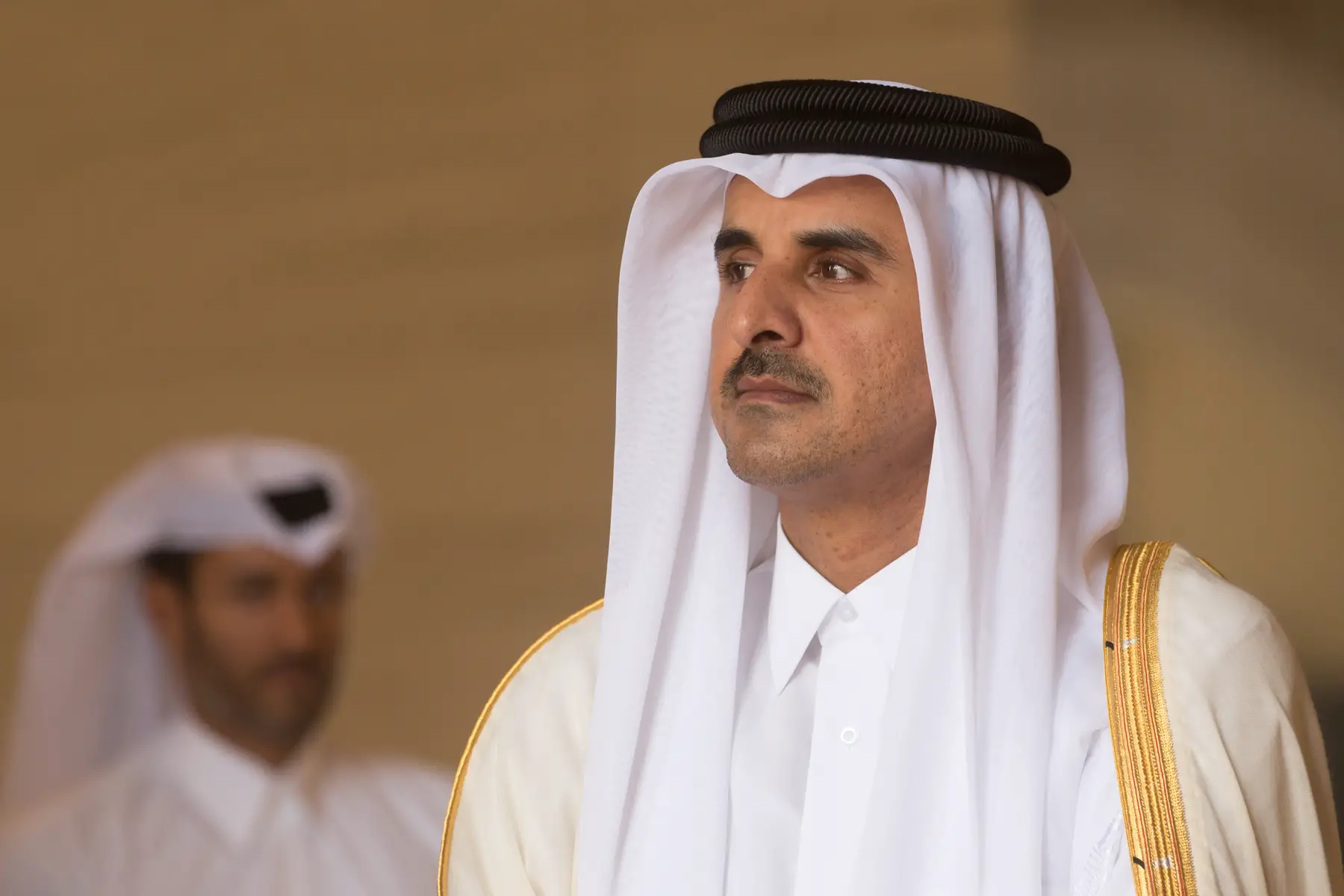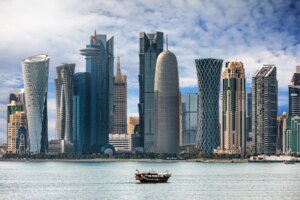Qatar’s news landscape may be different from what you’re used to. But armed with an open mind and our guide to local newspapers, TV and radio channels, and news websites, you’ll soon have all the information you need at your fingertips.
Learn more about the news in Qatar, including which news sources to trust and which to avoid, by reading the following sections:
Ground News
Get every side of the story with Ground News, the biggest source for breaking news in Qatar and around the world. This news aggregator lets you compare reporting on the same stories. Use data-driven media bias ratings to uncover political leanings and get the full picture. Stay informed on stories that matter with Ground News.
The media landscape in Qatar
Qatar is a pioneer in media investment, with its first mass media outlets – both radio and TV – launching in the late 1960s and early 1970s. Indeed, for just the world’s 158th-largest country, its global media impact sure packs a punch. For example, the Doha-based news channel Al Jazeera is beamed into homes across the planet, reaching more than 430 million households worldwide.
Behind the colorful headlines, however, Qatar’s local media is disappointingly bland. Prepare to be underwhelmed with the way local news and current affairs are presented to the country’s 2.7 million residents.

Often, local stories on sensitive topics – for example, the alleged treatment of migrant workers widely reported in global media – are somewhat diluted versions of reality. Most media outlets are owned by the state, members of the royal family, or figures aligned with them. As such, they, like wider society, show deference to the ruling Al Thani family, and you’ll feel either refreshed or frustrated with the unwavering loyalty to the establishment and social harmony.
That said, the media is finding its voice, and the Qatari press is now considered freer than that of Greece, Thailand, and Israel. The gradual relaxation of local media has coincided with changes in the way the population digests news, whether that’s the massive expat population or its youthful native population. Around 50% of social media users (41% of Qatari nationals and 51% of expats) go online to get their fix of local goings-on.
Political bias of the Qatari media
Qatar has been under intense international scrutiny over the last decade or so, thanks to its high-profile role in Middle East geopolitics and its hosting of the 2022 FIFA World Cup.
According to the Reuters Institute (2022), most media outlets toe the government line, with the exception of independent current events blog Doha News. And while foreign outlets typically offer a more in-depth view of local topics, they are not necessarily more balanced.
In fact, some foreign reports about Qatar have been criticised as misleading, uninformed, and – sometimes – just plain lazy. Many international story lines use a narrative that “has grains of truth to it but, just as often, is an uninformed caricature or is exaggerated” (Reuters Institute, 2022).
We recommend you always cross-reference your preferred news sources (e.g., with Ground News) to stay clear of potential bias.
Freedom of the press in Qatar
Qatar has some pretty harsh media laws that can make journalism a real challenge. For example, one of the most common risks for reporters is to be accused of trespassing. Even with all the right permits, they often get assaulted or even arrested to prevent them from reporting on a story.
It’s quite understandable, then, that many journalists practise self-censorship and avoid critical reporting on local and foreign affairs.

Qatar ranks 79th out of 180 nations worldwide on the 2025 World Press Freedom Ranking, scoring 58.3/100.
Do the Qatari have trust in the press?
Unlike in many other parts of the world, trust in the media in Qatar is increasing. In 2021–2022, an incredible 77% of the population trusts that the news is reported fully, fairly, and accurately. By comparison, the world average of press trust is only 40% (Reuters Institute, 2024).
Interestingly, however, most Qataris are aware of the government’s interference with the news. Roughly 31% think the reported news is free from officials’ meddling (NU-Q, 2022).
Where to get the news in English in Qatar?
English-language newspapers and magazines
You can find imported international newspapers from Asia, Europe, and the US in Doha supermarkets and bookstores popular with expats. Mind you, though, they’ll be a few days old by the time they hit the shelves, and don’t come cheap. Alternatively, some international newspapers offer subscriptions with home delivery, although it may be easier to subscribe to the online version.
If you’re interested in keeping up with the local news, Qatar also has a number of English-language newspapers and magazines, including:
- Business Leaders – this monthly magazine was launched in February 2025 to rival The Edge
- The Edge – a monthly business magazine covering entrepreneurs, real estate, energy, technology, and finance in Qatar
- FACT (food, art, culture, travel) – a monthly arts and culture magazine
- Gulf Times – a steady and reliable broadsheet, but quite staid content. You can find free copies in hotel lobbies, or visit the website for details on home delivery options.
- The Peninsula – another established newspaper with solid but rather dry content. You can find copies in public areas around Doha, or contact the publisher to subscribe.
- Qatar Tribune – a print tabloid that follows a similar style and tone as its two rivals (though its circulation is less than that of Gulf Times or The Peninsula). It’s distributed for free in some public areas and is also available for home delivery.

Mark Lazell
Senior writer at Expatica
Insider tip: Don’t expect too much
Set your expectations on content. Hard-hitting commentary on important or controversial local issues is probably out. Expect plenty of slightly re-nosed press releases from official state sources Qatar News Agency (QNA) and national organizations.
English-language news websites and social media
If you prefer to get your news online, there are several English-language platforms that cover news, current affairs, and business in Qatar. For example, The New Arab is a UK-based news and current affairs website that provides in-depth coverage of the biggest stories from the Middle East, North Africa (MENA), and beyond.

Other well-known platforms include:
- Al Jazeera English – Qatar’s flagship 24-hour English news network offering excellent, in-depth, thought-provoking coverage of Middle East affairs (although there’s not much analysis of Qatar itself).
- Arabian Business – a respected Dubai-based portal with a dedicated Qatar economy and business section. Most content on the site is free to read.
- Arab News – an English-language news platform from Saudi Arabia
- Middle East Economic Digest (MEED) – a long-established regional brand that has an informative section on news from Qatar.
- Thomson Reuters – a high-quality, highly trustworthy, international news site with breaking news stories and features on countries in the region, including Qatar. Pay for full access to the service, or opt for some free features.
- Middle East Monitor – an independent source with a slightly different view of regional news; only occasionally covers Qatar.
English-language TV, radio, and podcasts
Besides the aforementioned Al Jazeera English, Qatar has two TV stations that broadcast news in English: Channel 2 of the state-run Qatar Television (QTV) and Alrayyan TV (also government-owned). And if you prefer listening to the news on the shortwaves, you can tune in to QBS Radio and sometimes Qatar Radio.
The country’s local English-language TV and radio stations resemble their newspaper cousins in terms of content. In other words, they are factual, to the point, but with minimal depth or analysis. A satellite or cable TV package will give you access to more substantive foreign news broadcasts, including those of BBC World, CNN International, EuroNews, and Sky News.
Of course, you can also catch up with Qatari and foreign news by streaming it online. For example, the podcast The Lovin Doha Show discusses top trending stories in the capital city, including any current events.
There are also many international news outlets that have free podcasts, like:
- The New Arab Voice – a podcast from The New Arab
- Global News Podcast – a BBC news podcast focusing on global news
- The Daily – an American podcast from the New York Times
- Today Explained – an American podcast from Vox Media
- ThePrint – an English-language podcast focusing on news from India
- Bangla News – a Bangladeshi podcast from Dhaka Post
Where to get Arabic-language news in Qatar?
National and local newspapers and magazines
Qatar has five Arabic-language newspapers, which tend to have more engaging content than their English-language counterparts.

Titles include (in alphabetical order):
- Al Araby Al Jadid – a daily newspaper that holds strong value among Arab intellectual and political elites
- Al Raya – the second-most widely read broadsheet in Qatar, with a clear pro-government editorial stance.
- Al Sharq – Qatar’s largest and most read newspaper, which also leans pro-government but may offer an alternative emphasis
- Al Watan – a Doha-based daily news outlet that was named the fourth most influential Arabic newspaper in 2020
- Lusail – Qatar’s first fully economic-focused daily paper
Specialist newspapers and magazines
Qatar also hosts a rich selection of Arabic‑language print magazines that can help keep you up to date. Seemingly, if you have an interest, you’ll be able to find a weekly, monthly, or periodical publication dedicated to it.
Some of the larger magazines include:
- Business and finance: e.g., Al‑Moltaqa and Qatar Al Yom
- Celebrity and lifestyle: e.g., BLOOM, Jamila, Qatar Happening, and Qatar Today
- News and politics: e.g., Al Dana, Brooq Magazine, and Jassem
Arabic news websites and social media
Many in Qatar (and elsewhere) get the bulk of their news online, whether that’s through websites, social media, or news apps. Virtually all traditional media outlets have an online presence, and while many are free to access, some have hidden their content behind a paywall for subscribers only.
Popular news sites include:
- Al Arab – the country’s first Arabic daily newspaper, which relaunched as an online-only platform in 2007
- Al Araby Al Jadid – website of the daily newspaper
- Al Raya – website of the popular broadsheet
- Al Sharq – website of the most-read paper in Qatar
- Al Watan – website of the influential newspaper

In January 2025, Qatar had 2.59 million social media users, which is around 84.0% of the population. About half of these used the platforms to stay informed about breaking news and current events.
According to IPSOS (2024), the most-visited social media platforms for online news are:
- Youtube
- TikTok
Because social media posts are not editorially filtered for factual accuracy, fake news and disinformation can spread quickly. A recent example is the deepfake video of Qatar’s Emir, Sheikh Tamim Al Thani, calling American President Donald J. Trump a thief or robber, which went viral in May 2025. Indeed, and unsurprisingly, the rise of AI is making it harder for users to get tricked into believing dis- and misinformation.
The government has put forward several initiatives to combat fake news and disinformation. For example, in 2020, Qatar introduced stricter penalties for publishing “false or malicious news, rumors, or propaganda” with ill intent. If found guilty, perpetrators could face a fine of up to QR 100,000 and a prison sentence of up to five years.
Unfortunately, however, the new law doesn’t clearly define who determines what constitutes a rumor or fake news, how such a determination is made, or what standards are to be used in making it. This also makes it harder for local journalists to report on critical stories in their country.
Arabic-language TV, radio, and podcasts
The national stations, Qatar TV and Qatar Radio, are hosted by the Qatar Media Corporation. The only other commercial news outlet in Qatar is Al‑Araby TV.
Roughly 44% of Qatari nationals also listen to podcasts each week, whether for entertainment or current events. Some top-ranking Arabic-language news podcasts include:
- بعد أمس (Baʿd Ams) from Al Jazeera
- لنا (Lana) from Doha Debates + Sowt
- زاوية بودكاست (Zāwiya Podcast) from Zawya Arabic
Alternative news and citizen journalism in Qatar
While Qatar has carved out a role for itself as a Middle East peace broker and negotiator, Qataris are generally not really into political activism and investigative journalism.

Mark Lazell
Senior writer at Expatica
Insider tip: Armchair reporting
Armed with a smartphone and a social media platform, it can be tempting to tap into your inner news correspondent. But tread carefully; Qatar is a conservative society, and the local community would not look kindly on an expat diving headfirst into local – and potentially sensitive – topics.
News sources to avoid in Qatar
You should be cautious of using social media as your main news source. Information can easily be user-generated, and fake news spreads like wildfire. Anonymous Telegram channels and WhatsApp forwards are notorious for spreading unverified rumors, especially during major events (e.g., diplomatic disputes).

Tips on getting reliable news in Qatar
Separating fact from fiction can be difficult for expats who have relocated to a new country. There’s a lot of information out there, and it’s hard to know which sources to trust or discard. The key to stopping the spread of misinformation is learning how to spot it. Here are some top tips from the experts:
- Develop a critical mindset when following news coverage. Instead of relying on just one source, cross-check different news platforms across the political divide.
- Consider what might be missing from the news report; fake news often leaves out information
- Double-check whether quotes attributed to a particular person or group have been represented accurately
- Look for fake images. If the story is false, the images may include stock photos, fake pictures, or images that are not relevant to the news story. If the image is found online, you can check it with Google Reverse.
- Always check the website’s URL. Scammers often create copycat websites to misinform, promote dodgy products, or phish for your information.
There are some resources out there specifically designed to help you assess news articles and sources for accuracy, bias, and reliability. Some of the services operating in Qatar include:
You can also ask trusted friends and contacts in your circle for their views on local issues. Better still (and even more rewardingly), befriend a Qatari to get a more based view on their country, life, culture, and regional developments.
Useful resources
- Arab Fact-Checkers Network (AFCN) – an organization supporting fact-checkers in the Arab region
- BOOM – an independent digital journalism platform that provides fact-checking of viral news stories






